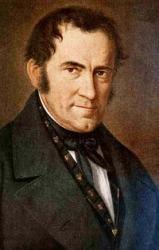
1792 - 1848 Scripture: Isaiah 7:14 Author of "Silent Night, Holy Night" in Moravian Book of Worship Joseph Mohr was born into a humble family–his mother was a seamstress and his father, an army musketeer. A choirboy in Salzburg Cathedral as a youth, Mohr studied at Salzburg University and was ordained in the Roman Catholic Church in 1815. Mohr was a priest in various churches near Salzburg, including St. Nicholas Church. He spent his later years in Hintersee and Wagrein.
Bert Polman
=================
Mohr, Joseph, was born at Salzburg, Austria, on Dec. 11, 1792. After being ordained priest on Aug. 21, 1815, by the Roman Catholic Bishop of Salzburg, he was successively assistant at Ramsau and at Laufen; then coadjutor at Kuchl, at Golling, at Vigaun, at Adnet, and at Authering; then Vicar-Substitute at Hof and at Hintersee--all in the diocese of Salzburg. In 1828 he was appointed Vicar at Hintersee, and in 1837 at Wagrein, near St. Johann. He died at Wagrein, Dec. 4, 1848. The only hymn by him translated into English is:—
Stille Nacht! heilige Nacht! Christmas. This pretty little carol was written for Christmas, 1818, while Mohr was assistant clergyman at Laufen, on the Salza, near Salzburg, and was set to music (as in the Garland of Songs) by Franz Gruber, then schoolmaster at the neighbouring village of Arnsdorf (b. Nov. 25, 1787, at Hochburg near Linz, died June 7, 1863, as organist at Hallein, near Salzburg). What is apparently the original form is given by 0. Kraus, 1879, p. 608, in 3 stanzas of 6 lines, and in Dr. Wichern's Unsere Lieder, Hamburg, 1844, No. 111. Another form, also in 3 stanzas of 6 lines, is in T. Fliedner's Lieder-Buch für Kleinkinder-Schulen, Kaiserswerth, 1842, No. 115, and the Evangelical Kinder Gesang-Buch, Basel, 1867. The translations are from the text of 1844.
1. Holy night! peaceful night! All is dark. By Miss J. M. Campbell in C. S. Bere's Garland of Songs, 1863, and thence in Hymns & Carols, London, 1871.
2. Silent night! hallowed night. Land and deep. This is No. 131 in the Christian Hymn Book, Cincinnati, 1865. It is suggested by, rather than a translation of the German.
3. Holy night! peaceful night! Through the darkness. This is No. 8 in J. Barnby's Original Tunes to Popular Hymns, Novello, N. D., 1869; repeated in Laudes Domini, N.Y., 1884, No. 340.
4. Silent night! holy night! All is calm. This is in C. L. Hutchins's Sunday School Hymnal, 1871 (1878, p. 198), and the Sunday School Hymn Book of the Gen. Council of the Evangelical Lutheran Church in America, 1873, No. 65.
5. Peaceful night, all things sleep. This is No. 17, in Carols for St Stephen's Church, Kirkstall, Leeds, 1872.
6. Silent night, holiest night. All asleep. By Dr. A. Edersheim, in the Sunday at Home, Dec. 18, 1875, repeated in the Church Sunday School Hymn Book, 1879, No. 35.
7. Silent night! holy night! Slumber reigns. By W. T. Matson, as No. 132, in Dr. Allon's Children's Worship, 1878.
8. Still the night, holy the night! Sleeps the world. By Stopford A. Brooke, in his Christian Hymns, 1881, No. 55.
Translations not in common use:--
(1) "Stilly night, Holy night, Silent stars," by Miss E. E. S. Elliott, privately printed for the choir of St. Mark's, Brighton, about 1858, but first published in the Church Missionary Juvenile Instructor, 1871, p. 198. Also in her Tune Book for Under the Pillow, 1880. (2) "Holy night! calmly bright," by Mary D. Moultrie in Hymns & Lyrics by Gerard Moultrie, 1867, p. 42. (3) "Silent night, holiest night! Moonbeams," by C. T. Brooks, In his Poems, Boston, U. S., 1885, p. 218. [Rev. James Mearns, M.A.]
--John Julian, Dictionary of Hymnology (1907)
================
Mohr, Joseph, p. 760, ii. The translation "Stilly night, starry and bright," in Farmer's Glees & Songs for High Schools, 1881, p. 36, is by Archdeacon Farrar.
--John Julian, Dictionary of Hymnology, Appendix, Part II (1907)
See also in:
Hymn Writers of the Church
Joseph Mohr



